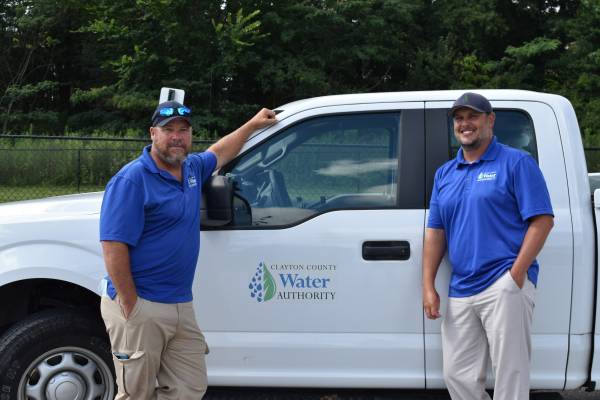Meet CCWA’s Leak Detection Crew made up of Crew Leader Kevin Chapman and Leak Detection Technician Chris Biles. Their job is to find leaks within the water distribution system throughout the county. CCWA was the first utility in Georgia to have a dedicated leak detection program. Prior to the development of the program in 2000, CCWA experienced approximately 20% of water loss annually. Since this program was created, CCWA’s water loss has been reduced to 8.2% annually. This correlates to finding 731 leaks recovering over 6,043,309,380 gallons and saving approximately $4,619,984.65 in production costs.
To find leaks, Kevin and Chris place loggers inside meter boxes throughout the county. These loggers listen to the meters throughout the night and send a signal to a program on their tablet. The program then gives them a reading that determines the probability of a leak in that area. They then visit all the locations with a high leak probability to find the direct source of the leak.
They use a listening device on individual meters that magnifies the sound of the water running through the pipe to individual meters and determine if a leak is in the distribution line. During the day, most customers are out of the house and aren’t using water. If the guys can hear water running on the line, this is a good indication of a leak. “We’re able to find and notify customers of leaks that they may not know they have,” Kevin says. They work in map zones, starting in one area of the county and work their way around. It takes approximately three years to test the entire county for underground leaks using their current system.
Sometimes leaks can be detected from the surface. When customers call in with concerns of water running into the street, Kevin and Chris test the water for chlorine. If trace amounts of chlorine are found in the sample, they can conclude that the water is coming directly from the distribution line and not from a nonpotable source like stormwater or wastewater. On the other hand, many leaks may be underground and never reach the surface. “We like knowing that we are able to find nonsurfacing leaks,” adds Kevin. “We have a job where we can save water and save CCWA money”.
Challenges they face include pinpointing the exact location of leaks for crews – this prevents repair crews from digging where it isn’t necessary. However, Kevin and Chris usually pinpoint the location within 3 or 4 feet. They must also work around the limitations of their equipment. “Working around a lot of outside noise can affect the way our equipment works”.
When asked what they liked about their job, Kevin and Chris say they like having a job that is important. “There will always be leaks to find but being proactive and finding them quicker usually makes it an easier repair for us and less property damage for the customers,” Kevin says.
CCWA’s Leak Detection program celebrated 20 years in May. The success of the program has brought water professionals from around the state to learn about this innovative program. The development and success of this program is another example of how CCWA is innovative and industry leading. #waterprofessionals

